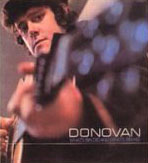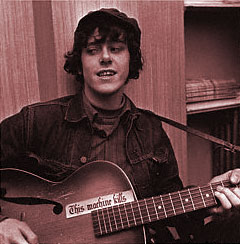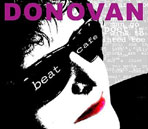
|
|||
|
|||
| Home |
| Gallery |
| Culture/ Technology |
| Fiction |
| Music |
| Poetry |
| Theater |
| What's New |
| About/Contact |
| Archive |
|
It ain't all over yet, baby blue Published July 2005 'Who's this Donovan?" demands a surly Bob Dylan. "He's a very good guitar player – better than you," replies the Animals' Alan Price. "I hate him already," Dylan says.
Donovan-bashing runs throughout "Don't Look In an ugly but climactic scene later in the film, Donovan, Dylan and a very starstruck, inebriated cast of Dylan toadies lounge in a hotel room. Donovan croons his slavishly Dylan-derivative ditty, "To Sing For You," for the assemblage; Dylan counters by picking up the guitar and performing an intensely scornful rendition of "It's All Over Now Baby Blue" while smirking directly at Donovan, whose own facial expression and body language betray a sort of degradation to make all who witness it feel exceedingly ill at ease. It's to Donovan's eternal credit that he ever recovered from this personal, professional and very public humiliation; it certainly would have been easier to crawl into a hole and disappear forever. Yet recover he did, summarily moving on from the early Bob-shtick to record a long string of hits which included classic folk anthems ("Catch The Wind," "Colours," "Universal Soldier"); lilting pop sonnets ("Jennifer Juniper," "Lalena," "Wear Your Love Like Heaven"); and starry-eyed psychedelia ("Sunshine Superman," "Mellow Yellow," "Hurdy Gurdy Man").
Yet for all his success in the '60s and '70s, Donovan – nee Donovan Leitch in 1946 – has been underestimated and all but forgotten since his commercial glory days; buried in the sands of time like some elfin, embarrassing relic of the hippie era that the collective pop consciousness would just as soon disregard. This is partially Donovan's own fault – his fey, mystic flower-child posturing, replete with flowing robes and daisies in the hair, was difficult to endure in contemporaneous times; with modern hindsight, his image seems evermore the ludicrous cliché – and extra curious when taking into account that Donovan hails from Glasgow, a city perhaps rivaled only by Tijuana for the premium its male denizens place on machismo. At the time I saw him in concert, Donovan was touring in support of his wonderful album, "Sutras," a Rick Rubin-produced reclamation project that went unnoticed in the wake of Rubin's concurrent Johnny Cash renovation; for all its merit, "Sutras" wasn't gonna compete with the Man In Black's comeback.
Perhaps Donovan shall simply never be forgiven his past dorkiness or the mortal sin of his advancing age, but "Beat Café" is a release to cherish and marvel at. In fact, I'd go so far as to assay it as an equally listenable yet less derivative album than Dylan's celebrated "Love And Theft" of a few years back; who's smirking now? In short, it ain't all over yet, baby blue. |
Copyright ©
Reprinted by permission of author, who retains all copyright and control.

 Back,"
Back," Perhaps more importantly, Donovan remained a very likeable sort throughout the years, which is more than can be said of the musical schoolyard bully Dylan, who is truly a jerk's jerk. Guess what else? Donovan was a better guitar player than Dylan all along; this was borne out when I saw him in concert in 1996, to be surprised and delighted by the man's undervalued musicianship, engaging stage presence, knack for yarn-spinning and continued excellence as a singer/songwriter.
Perhaps more importantly, Donovan remained a very likeable sort throughout the years, which is more than can be said of the musical schoolyard bully Dylan, who is truly a jerk's jerk. Guess what else? Donovan was a better guitar player than Dylan all along; this was borne out when I saw him in concert in 1996, to be surprised and delighted by the man's undervalued musicianship, engaging stage presence, knack for yarn-spinning and continued excellence as a singer/songwriter. So what to make of the reasons why Donovan's latest,
So what to make of the reasons why Donovan's latest,